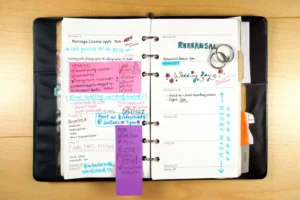Few Christians have failed to hear that sex before marriage is wrong, but a majority of Christians still do it. What difference does that choice have on a couple’s future marriage?
In this second installment of our interview with Dr. Scott Stanley, we see how sex causes a couple to be unable to objectively determine the potential of their relationship. As both an acclaimed marriage researcher and a committed student of the Bible, Dr. Stanley has found the wisdom of premarital sexual restraint borne out in research on marriage selection patterns.
We think you’ll find his metaphor of the boiling pot to be as simple and memorable as we did.
* * *
Dr. Scott Stanley: The number one biggest error people make when they’re selecting a mate is sliding through transitions rather than making clear decisions. What you see now is people sliding versus deciding. This comes directly out of research we’ve done on cohabitation. There we see couples make a transition to living together without making an actual decision or thinking about how intertwining their lives will make it harder to end their relationship if they want to. While they haven’t really clearly decided on each other; they’ve just made it harder to get away from each other.
Candice: So the test drive they thought would ensure a stronger marriage has actually guaranteed a weaker start.
Dr. Scott Stanley: Exactly. That’s why the cohabitation research is so clear. The people who are at the greatest risk are people who are giving up their choices in life before they’ve really made a clear decision that this person is the one they want to be with. This is very damaging for women because they are now much more likely than ever before (perhaps in the history of the world) to be gaining lots of information about how risky a particular relationship is way after the time that it is easy to do something about it and choose a different path. The time to be finding out whether this is the right guy for you (whether he’s a risky or safe guy and whether he can commit and sacrifice for you) is not after you’re already living together and it’s hard to move apart.
Steve: Couldn’t any couple entering into a relationship without a goal be in danger of sliding through transitions like this? As they become more emotionally and physically intimate and then dependent on each other, isn’t it more likely they would make relational transitions through sliding rather than making their decisions intentionally?
Dr. Scott Stanley: Absolutely. I think that’s very much the case. One of the difficulties for anybody in this stage of life is they don’t see real clearly when they’re head-over-heels in love. And there’s a tremendous amount of evidence of this. If the physical relationship becomes the defining feature of the relationship — and at certain stages it virtually always is—what happens is that you’re going to see things more positively than they are. When you’re totally in love and the hormones are really rolling, you’re going to miss things that you should have been able to pick up on.
I was making breakfast for my boys one morning, which I do most mornings when I’m in town. And my son Kyle likes smoky links. So I was boiling some water and I threw some smoky links in the pot. And here’s this really hot bubbling, pot of boiling water with a few smoky links in it for Kyle. And as it’s about to boil over, I notice it’s all white and foamy. And I’m thinking, if I didn’t know what was in that pan, I definitely couldn’t tell when it’s this hot and bubbling over. If you’re cooking and you want to know what’s in the pot, and it’s bubbling too much or boiling over, you don’t see what’s in there unless you remove some of the heat. You have to cool it off a bit and pull it back down a bit or else you don’t see really clearly what’s in there. Now, I happened to know what was in there because I put it in there.
But when we’re falling in love with somebody that we don’t know and there’s a lot of heat; it’s bubbling but we don’t see so clearly what’s in the pot. That could be a really great meal. That could be like the meal for the rest of our lives in terms of what God asks for us, or it could be like the worst possible thing that we could eat. I mean it could be disastrous and we’re not going to see clearly if we don’t get the heat back down a bit.
Candice: And how do you do that? How do you take the heat down?
Dr. Scott Stanley: Well you turn that little knob on stove and it just – or you remove the pot from the burner.
Candice: Yeah, right. Let’s apply it to some people.
Dr. Scott Stanley: Oh, you want to be practical.
Candice: Yes, Professor. Don’t speak in abstractions.
Dr. Scott Stanley: Darn. This is way too hard. OK. Let’s accept the fact that what parents often want to do—isn’t the one that’s going to work very well for most of these situations. Because what parents usually want to do is pull the pan completely over to a cold burner and say, “I don’t think you see very clearly. I have a hunch of what’s in that pot, or at least I don’t think you have a clue what’s in the pot, and you can’t see her again. You need to quit seeing him.” You know something like that. “In fact, I’m going to pull it off the burner and dump it in the sink or whatever.”
Well, let’s talk about 25-year olds. Their parents aren’t likely to be even attempting to pull it off the burner, (that doesn’t happen so much any more), and the couple is not so likely to choose that option themselves.
But let’s say they were really, really mature and understood — this is a danger to us because we can over interpret our love right now, and its degree of sustainability, and what it really means in terms of depth of what’s possible in life. The way to regulate the temperature, just like with the stove, to turn it down in a dating relationship means you have to remove some of the heat. And that could mean several things. One is that could mean reducing some of the amount of contact. You know, if you’re just falling in with somebody, it’s so easy; it’s almost so expected; that you’re with each other almost every spare minute, but that’s really like having the full heat on all the time.
Candice: And alone. Isn’t that a big part of it?
Dr. Scott Stanley: Exactly. Nobody is around. There’s no accountability. There’s total intensity and that’s total heat all the time. So cooling it down a bit would include things like deciding not to see each other everyday; seeing each other when other people are around in groups; intentionally doing things that reduces the heat by adding reasonable structure to the relationship.
Now, a trick of this, by the way, is that the expectation now is so common for total heat all the time — no structure, nobody around, we’re alone, and, of course, often getting pretty physical, so putting limits on all of those things is a way to reduce the heat. But now our Christian couple has got another dilemma. Because since they’re so involved in the world’s mindset about this, it’s just the normal way you do it now when you’re 25 or 26 or 30 or 40, it’s going to be real tricky for us to not have doubts if we actually have that structure. Because one of the things that the total intensity reassures us of is that the other person is not potentially falling in love with someone else right now. You know, if you’re with me all the time and I’m with you all the time, I don’t have too much of a fear about whether you might want to be with somebody else, or even would be with somebody else. So now we have this other odd little dilemma where we actually have to have some trust for each other and discipline that we could actually cool it off without thinking each other is running toward another burner. Or there’s not even another burner over there saying, “come over here; I’ll be hot for you.”
And so there’s some level of talk that the two have to have. And by the way, it’d be an immensely mature kind of thing for a couple to be able to have this sort of talk. To say that they’re actually doing this constructively, positively and to protect their relationship, and they can have some trust for each other about this as opposed to letting it just totally weird them out about jealously, distrust, and what might happen.
Candice: Well, wouldn’t that be a fine test?
Dr. Scott Stanley: That in and of itself would be a fine test. In fact, let’s talk to women for a second here.
If a woman suggest this scenario (it’s all the more powerful if the guy suggest this scenario and in some ways could even be more likely), she’s doing something that I think is really crucial for women. Because as we have shredded all of the traditional steps and stages of courtship that existed through history in most cultures, in our culture now, I’ve come to think that the number one danger of removing those things that maybe people had started to think were sort of quaint and not needed is that all of the traditional steps and stages of courtship did two things. One is they provided the structure for couples and they slowed things down. And the other, which I think is less clear to people, is they were windows of opportunity for women to get a read on how serious and committed a particular male was.
Copyright 2007 Scott Stanley. All rights reserved.










